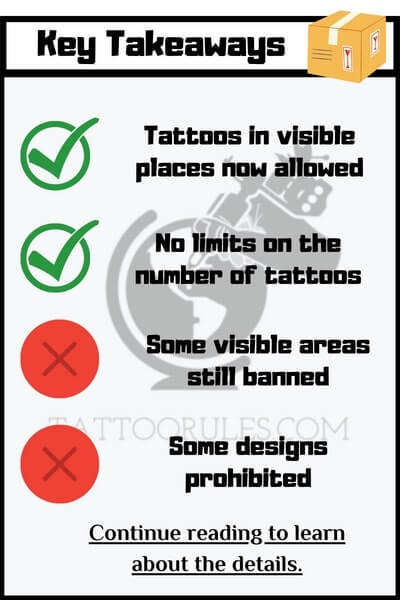
Okay, let’s dive into this tattooed territory.
Ever wondered if that killer ink you’re rocking might actually be holding you back?
Specifically, when it comes to landing a dream job with a luxury brand?
I get it.
You’re stylish, talented, and your body is a canvas.
But will Chanel see it that way?
Let’s talk about visible tattoos and if they’re acceptable in the high-end world.
The Luxury Brand Stigma: Is it Real?
Okay, let’s be honest.
There’s still a perception out there.
Luxury brands, for a long time, have cultivated an image of classic elegance.
Think pearls, tailored suits, and… well, not always tattoos.
But times are changing.
I’ve seen firsthand how companies are evolving.
My friend Sarah, a total fashionista with a sleeve, just landed a gig at Gucci.
So, what gives?
Visible Tattoos: The Shifting Landscape of Luxury
The good news?
The world is becoming more accepting.
Luxury brands are starting to recognize that their clientele is diverse.
And that diversity extends to the people who represent them.
Here’s what I’ve noticed is making a difference:
-
Brand Identity: Is the brand edgy or traditional? A brand like Alexander McQueen might embrace tattoos more readily than, say, Hermès.
-
Role Matters: A back-of-house designer might have more freedom than a front-of-house sales associate.
-
Placement is Key: A small, discreet tattoo is often less of an issue than a full sleeve or neck tattoo.
-
Coverage Options: Can you easily cover the tattoo if needed? This shows willingness to adapt.
How to Navigate the Tattooed Terrain in Luxury
So, you’re inked and aiming for luxury.
Here’s my advice:
-
Research the Company Culture: Stalk their social media. Attend events. Get a feel for their vibe.
-
Consider Your Placement: If you’re planning new ink, think strategically.
-
Highlight Your Skills (Always): Your talent and experience are paramount. Make sure your resume and portfolio shine.
-
Address it Proactively (Maybe): This is tricky. If it’s unavoidable, address it briefly and professionally. Something like, "I’m passionate about fashion, and my tattoos are a form of self-expression. I’m also happy to adhere to any dress code requirements."
-
Confidence is Key: Rock your style with confidence. If you feel good, you’ll project that.
Real Talk: Personal Branding in the Luxury Sector
Your personal brand matters.
Are your tattoos part of your identity?
Or are they something you’re willing to conceal for a job?
It’s a personal decision.
I know a makeup artist who uses her hand tattoos to showcase her artistry.
It’s part of her brand.
But a financial advisor might choose to keep their ink covered in client meetings.
It’s all about knowing your audience.
Are Visible Tattoos Acceptable? The Bottom Line
It’s not a simple yes or no.
The answer depends on the brand, the role, and your overall presentation.
But don’t let your ink hold you back from pursuing your dreams.
Show them your talent, your passion, and your unique perspective.
Luxury is evolving, and so is the definition of professionalism.
Ultimately, the question of whether visible tattoos are acceptable depends on a multitude of factors, but the industry is slowly but surely becoming more inclusive.
FAQ: Tattoo Edition
Q: What if I’m asked about my tattoos in an interview?
A: Be prepared. Keep your answer brief, professional, and positive. Focus on your skills and experience.
Q: Should I cover my tattoos for an interview?
A: It depends. If you’re unsure, it’s generally safer to cover them for the initial interview. You can assess the company culture later.
Q: What if a company has a strict "no visible tattoos" policy?
A: Respect their policy. Decide if you’re willing to adhere to it. If not, maybe that company isn’t the right fit for you.
Q: Are certain types of tattoos more acceptable than others?
A: Yes. Offensive or controversial tattoos are generally a no-go. Stick to tasteful, artistic designs.
Q: Does the size of the tattoo matter?
A: Absolutely. Smaller, more discreet tattoos are usually less of an issue than larger, more prominent ones.


